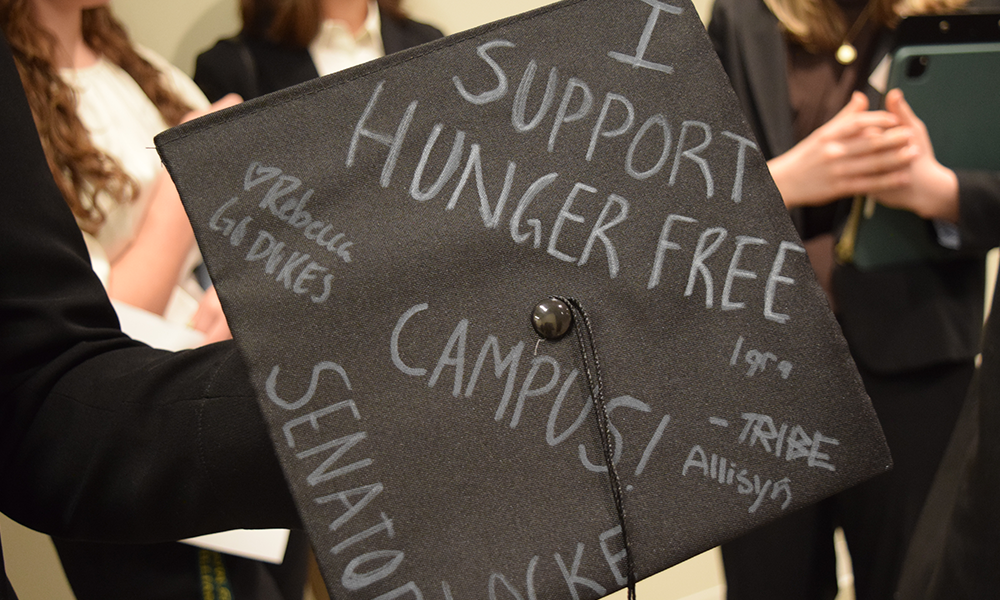Q and A: JMU students advocate for Hunger-Free Campus bill
JMU Headlines
SUMMARY: JMU students, faculty and staff traveled to Richmond in January for Advocacy Day to support the Hunger-Free Campus bill, legislation designed to support students facing food insecurity.
JMU students, faculty and staff traveled to Richmond in January for Advocacy Day to support the Hunger-Free Campus bill, legislation designed to support students facing food insecurity.
Below, students Natasha Chait, a first-year student in the clinical school psychology program, and Rebecca McCann, a fourth-year student in the elementary education program, share their insights from the experience and discuss the importance of this issue.
Q: Can you introduce yourselves and share your role in this initiative?
Natasha: I’m a first-year student in the clinical school psychology program, and my advisor, Dr. Owens, coordinated this event. We joined other students across Virginia to meet with legislators and lobby for the Hunger-Free Campus bill and support Swipe Out Hunger — a nonprofit that works to end college student hunger.
Rebecca: I’m a senior majoring in elementary education with a minor in sociology. Advocacy has been a huge part of my life at JMU, and after seeing peers in my program struggle with food insecurity, I knew I had to be involved in this initiative to support Swipe Out Hunger.
Q: What is the Hunger-Free Campus bill, and why is it important?
Natasha: It’s a bill that provides grant funding to colleges working to combat student hunger. If a school has programs like food pantries or meal fund allocations, they can apply for this support. The bill has passed in 10 states and been introduced in 12 others. At JMU, our campus pantry is used so often that it runs out of supplies frequently.
Rebecca: In 2023, 37.8% of JMU students reported experiencing food insecurity, and numbers like these are consistent across the commonwealth. The Hunger Free Campus Bill would provide financial support to strengthen programs here on campus. This bill helps bridge that gap and makes education more accessible by ensuring students can access the support resources they need.
Q: What motivated you to join this advocacy effort?
Natasha: My background is in school psychology, and I previously worked in NYC public schools where I saw students dealing with food and housing insecurity. Supporting students’ basic needs is something I’ve always been passionate about.
Rebecca: I’ve seen firsthand how food insecurity affects students in the education program. I believe every student deserves access to basic necessities so they can focus on learning and succeeding during their time at JMU. Advocacy work is very important to me, so when I was given the opportunity to help my fellow students, I knew I had to go!
Q: What was it like speaking with legislators about this issue?
Natasha: It was a powerful experience. Delegate Marty Martinez stood out—he already had connections with JMU and was genuinely interested in supporting us. Even when we met with staffers, they were open and receptive.
Rebecca: It was empowering. Legislators really responded to the personal stories we shared. That emotional connection made the issue feel real to them, not just another statistic.
Q: Did anything surprise you during your conversations with representatives?
Natasha: I was surprised at how supportive the meetings were. Legislators were already aware of the issue and genuinely wanted to help.
Rebecca: I’ve done advocacy work before, but I was impressed by how engaged and willing the representatives were to listen. It was amazing to see how much they, or their staff, cared about the stories we brought to the table.
Q: What strategies did you use to communicate your message effectively?
Natasha: We used the “Head, Heart, and Hand” strategy—presenting data (the head), sharing personal stories (the heart), and ending with a specific ask (the hand). Each person in our group focused on one element to ensure a well-rounded message.
Rebecca: I prepared by gathering personal stories from my peers, statistics from sources on campus, and even photos of the food pantries from all over campus. That visual and emotional context really helped make our case stronger.
Q: What were some challenges you encountered?
Natasha: Figuring out how to share our message clearly and concisely was tough, especially tailoring it to different types of listeners.
Rebecca: The legislative process itself was a challenge—it’s complicated! Another challenge was addressing skepticism from legislators who didn’t grasp how serious food insecurity is on college campuses. We had to be ready with facts, stories and visuals.
Q: What was the most impactful part of the experience for you?
Natasha: Delivering graduation caps with supportive messages to legislators felt like a strong visual symbol that helped us leave a lasting impression.
Rebecca: Being surrounded by fellow advocates and witnessing genuine concern from legislators made me feel hopeful. There was such a strong sense of community and commitment to change from many that I interacted with over the course of the day.
Q: What’s next in your advocacy journey?
Natasha: I want to keep finding ways to support JMU students and make sure food insecurity remains a priority in student services and funding decisions.
Rebecca: Since I’m graduating in May, I’m focused on preparing future leaders to continue this work. I want to ensure they have the tools and support to keep advocating for basic needs on campus and across Virginia.
Q: Final thoughts?
Natasha: Supporting students’ basic needs is essential. No one should have to choose between their education and their next meal.
Rebecca: I’m grateful to Swipe Out Hunger for this opportunity. This trip reminded me that when we work together and share our stories, we can create real change.
The Hunger-Free Campus Bill was signed into law by Virginia Gov. Glenn Youngkin on March 24, 2025.
